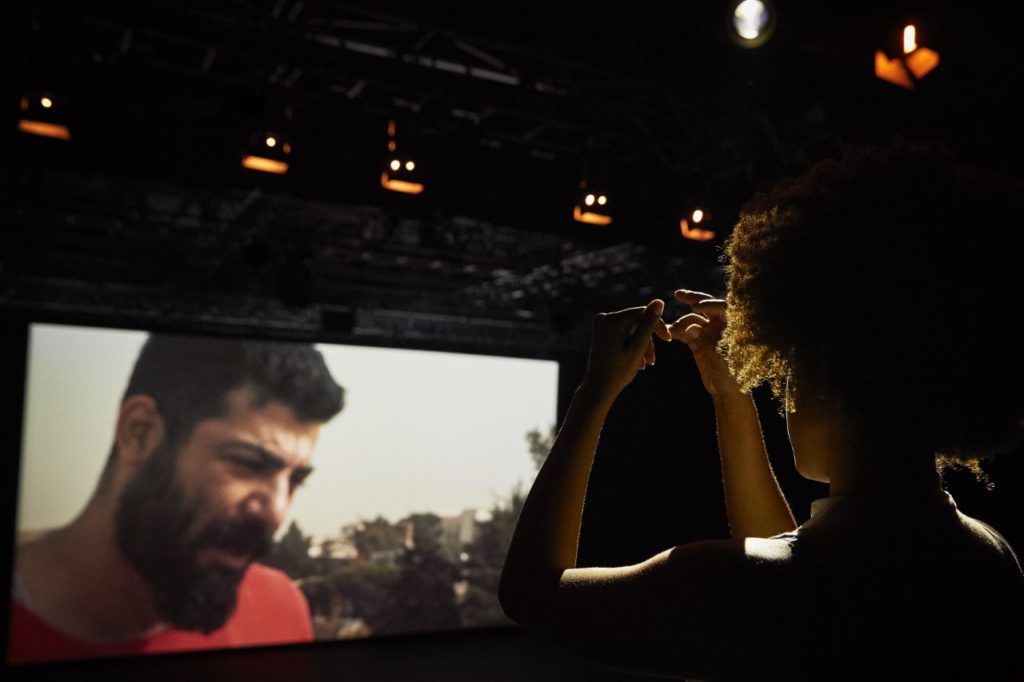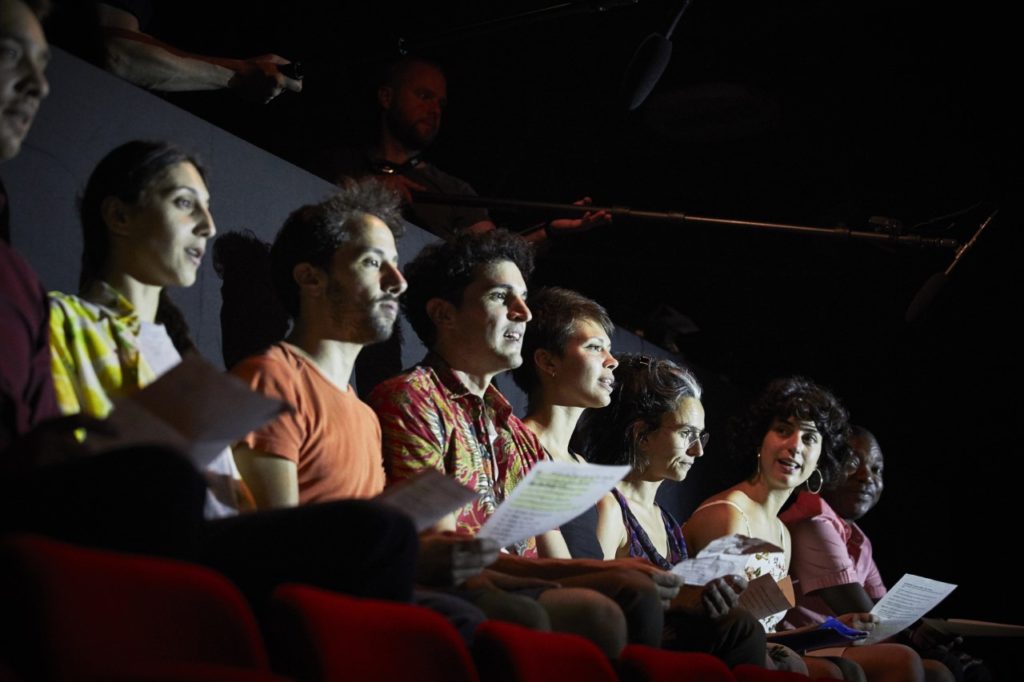Avignon 2019: Staging the impossible. On exile, community and hope in Christiane Jatahy’s Le Présent qui déborde – Notre Odyssée II

Photo, Christophe Raynaud De Lage: Le Présent qui déborde. Notre Odyssée II, O Agora que Demora
Exile, migration, refugee crisis, loss of home and family, and death are among many realities and concerns that the discussion of history, memory and collective identity today in Europe and elsewhere demands. Avignon 2019 pays special attention to these urgent topics with more than a few productions telling stories of displacement.
Le Présent qui déborde – Notre Odyssée II, O Agora que Demora is an epic tale of today’s exile based on Homer. It was written, produced, filmed and staged by Christiane Jatahy, a theatre maker from Brazil, currently an exile herself, who lives now in Belgium. An exploration of the Le notion “borders”, as a geographical, political, cultural and artistic phenomena, Le Présent qui déborde is a second part of Jatahy’s diptych, Our Odyssey, with tis first part Ithaca premiered on 16 March 2018 at the Ateliers Berthier de l’Odéon-Théâtre de l’Europe, in Paris.
A multimedia project, in which the limits of theatre and film are investigated, Le Présent qui déborde mixes film projection with live theatre action, with several actors, musicians, and singers who appear both on the screen and in the audience, interacting with each other and with others projected on the screen. A result of Jatahy’s extensive research, the documentary sequence of Le Présent qui déborde was filmed in five countries: Palestine, Lebanon, Greece, South Africa and Brazil, where the presence of refugees is the most visible. Focusing on the fate of the professional theatre makers-refugees, Jatahy felt it her personal responsibility to tell their stories: to present contemporary odyssey as experienced by artists, who ended up in the limbo of the refugee camps without any prospects of going back home or finding professional employment in the future. Many of the actors, who we see on the screen, are still in the camps and were unable to patriciate in the live part of the performance. Yara Ktaish, a Syrian performer, was a “lucky” one. After months of imprisonment in Syria and six years of living in a refugee camp, she appears on the stage of the Avignon Festival to tell her story. The sheer fact that Yara was able to make it and that the audience can meet the actor both in her past and present conditions makes this encounter heart breaking. Seeing Yara live, among the audience members, dancing, singing and telling her tale in Arabic and English brings hope to other stories of displacement but it also points at the immensity of this modern tragedy.

To find a literary equivalent to tell this tragedy, Christiane Jatahy turned to Homer’s Odyssey. In the first part of the project, she used Homer’s texts interspersed with the stories of today’s refugees and their sea-crossings as she learned about them by interviewing the victims. The second part immerses the audience into the mixture of reality and fiction. The film takes over the performance’s narrative structure, it is “no longer about bringing reality into a fictional story, but to immerse stories in a lived experience, a truth”, the director explains. Exile undermines people’s dignity. Often it dismisses individuality and writes migrants off as invisible and voiceless objects. To resist this devastating effect of displacement, Jatahy films her subjects not only in the moments of grief, when they are reciting Homer’s verses or recounting personal struggles, but also during the rare moments of happiness, over a collective meal and telling stories to children. This way, Le Présent qui déborde reminds us of the fundamental power of theatre to tell stories and by doing it to bring joy and hope to others.
Christiane Jatahy does not shy away to make this journey personal to her own displacement either. Not only she appears on stage at the beginning of the show to explain its conceptualization and to prepare spectators for their aesthetic journey, she also inserts the mystery of her family into it, with her grandfather disappearing within the Amazonian forest after his plane crashed.
The cinematic portion of the production ends in the Amazonian forest of Brazil. It enacts the end of Ulysses’ journey, his return home. “When he arrives in Ithaca”, Jatahy explains, “Ulysses tells the seer Tiresias that in order to understand his past, he needs to meet people who have never seen the sea”. The indigenous people of the Amazon Rainforest are the keepers of the sacred knowledge who Jatahy seeks to see. She asks them to consult her and her audience on the next steps in the journey.
The last image we see is the peaceful waves of the floating river, the last sound we hear is the water drops made by actors and spectators snapping their fingers. Hence, by constantly re-connecting the filmed images and the sounds produced live, Le Présent qui déborde not only brings the stories of displacement home, it creates a new temporal continuum, it bridges the cinematic time of the past with the theatrical time of the present. This new temporality of co-creating a theatrical encounter implicates the audience into this continuum. The surround sound and movement of the actors – which take place not in front of us but among us – – re-enforce this sense of the community, a true agora of today, in which every person’s presence counts.
Le Présent qui déborde – Notre Odyssée II
O Agora que Demora, Based on Homer
Direction, film direction, dramaturgy Christiane Jatahy
With Faisal Abu Alhayjaa, Manuela Afonso, Abed Aidy, Omar Al Sbaai, Abbas Abdulelah Al’Shukra, Maroine Amimi, Vitor Araújo, Bepkapoy, Marie-Aurore D’Awans, Emilie Franco, Joseph Gaylard, Noji Gaylard, Renata Hardy, Ramyar Hussaini, Iketi Kayapó, Irengri Kayapó, Ojo Kayapó, Laerte Késsimos, Kroti, Yara Ktaish, Pitchou Lambo, Abdul Lanjesi, Melina Martin, Jovial Mbenga, Nambulelo Meolongwara, Linda Michael Mkhwanasi, Mbali Ncube, Pravinah Nehwati, Adnan Ibrahim Nghnghia, Maria Laura Nogueira, Jehad Obeid, Ranin Odeh, Blessing Opoko, Phana, Pykatire, Corina Sabbas, Leon David Salazar, Mustafa Sheta, Frank Sithole, Fepa Teixeira, Ivan Tirtiaux, Ahmed Tobasi
Artistic collaboration and stage design, lights Thomas Walgrave
Collaboration Henrique Mariano
Photography Paulo Camacho
Sound Alex Fostier
Music Vitor Araújo, Domenico LancellottiChristiane Jatahy
Production Théâtre national Wallonie-Bruxelles, SESC São Paulo, in co-production with Comédie de Genève, Ruhrtriennale (Allemagne), Odéon-Théâtre de l’Europe, São Luiz Teatro Municipal (Lisbonne), Riksteatern (Suède), Festival d’Avignon, Le Maillon Théâtre de Strasbourg Scène européenne, Festival Temporada Alta (Espagne), The Freedom Theatre (Palestine), Outreach Foundation (Afrique du Sud); and the help of the ateliers du Théâtre national Wallonie-Bruxelles for the stage set construction, In partnership with France Médias Monde
The show runs in Arab, Kurdish, Greek, English, Isizulu, French, Portugese, Kayapó… with French and English surtitles
Gymnase du lycée Aubanel, Avignon Festival, Jul 5-12, 2019